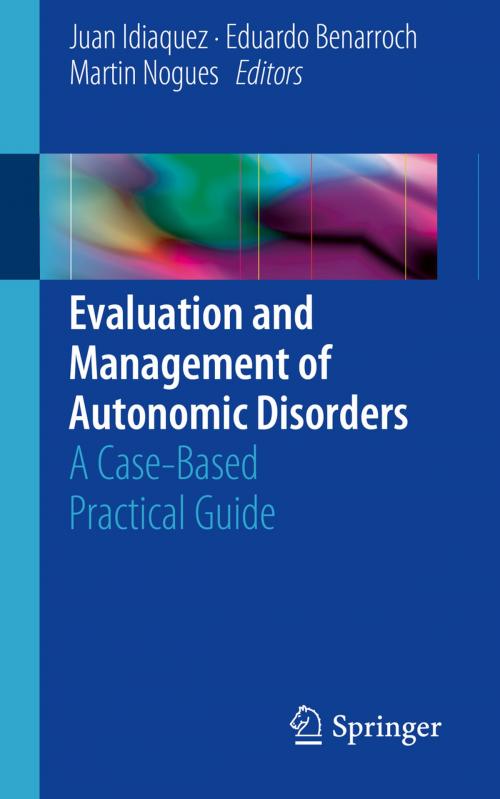Evaluation and Management of Autonomic Disorders
A Case-Based Practical Guide
Nonfiction, Health & Well Being, Medical, Specialties, Internal Medicine, Neurology, General| Author: | ISBN: | 9783319722511 | |
| Publisher: | Springer International Publishing | Publication: | March 2, 2018 |
| Imprint: | Springer | Language: | English |
| Author: | |
| ISBN: | 9783319722511 |
| Publisher: | Springer International Publishing |
| Publication: | March 2, 2018 |
| Imprint: | Springer |
| Language: | English |
This book approaches the basic features of autonomic dysfunction in a practical way, complemented by an examination of unique and didactic case reports. Unlike other books on autonomic disorders, its goal is to provide a brief, practical and ready to use resource for physicians faced with patients’ autonomic complaints.
Autonomic dysfunctions are specific disorders that affect or are related to the autonomic nervous system. Despite being primarily a field of neurology, it also has important ties to cardiology, endocrinology, gastroenterology and many other medical specialties. Moreover, as the action of the autonomous system tends to be diffuse, affecting different systems and organs throughout the body, its disorders may present a complex and multifaceted background
, complicating its diagnosis, clinical evaluation and management. Thus, it is important to gather all the relevant information about autonomic dysfunction in a handy and practical way, providing an accessible guide for professionals and practitioners across a wide range of specialties.
The content presented in this book is divided into two main parts: In the first part, the general principles of autonomic dysfunction are discussed. Here the reader will find information on the anatomy, physiology and pharmacology of the nervous system, the classification of autonomic disorders, general evaluation of these disorders and the principles of their management. In the second part, clinical cases for the most important autonomic disorders are presented and discussed in detail, particularly in light of their special importance for differential diagnosis.
Using a clinical case-based approach, Evaluation and Management of Autonomic Disorders offers readers – primarily but not exclusively general practitioners in the fields of neurology, internal medicine, family medicine and cardiology – rapid access to the information required for the evaluation and management of these complex patients.
This book approaches the basic features of autonomic dysfunction in a practical way, complemented by an examination of unique and didactic case reports. Unlike other books on autonomic disorders, its goal is to provide a brief, practical and ready to use resource for physicians faced with patients’ autonomic complaints.
Autonomic dysfunctions are specific disorders that affect or are related to the autonomic nervous system. Despite being primarily a field of neurology, it also has important ties to cardiology, endocrinology, gastroenterology and many other medical specialties. Moreover, as the action of the autonomous system tends to be diffuse, affecting different systems and organs throughout the body, its disorders may present a complex and multifaceted background
, complicating its diagnosis, clinical evaluation and management. Thus, it is important to gather all the relevant information about autonomic dysfunction in a handy and practical way, providing an accessible guide for professionals and practitioners across a wide range of specialties.
The content presented in this book is divided into two main parts: In the first part, the general principles of autonomic dysfunction are discussed. Here the reader will find information on the anatomy, physiology and pharmacology of the nervous system, the classification of autonomic disorders, general evaluation of these disorders and the principles of their management. In the second part, clinical cases for the most important autonomic disorders are presented and discussed in detail, particularly in light of their special importance for differential diagnosis.
Using a clinical case-based approach, Evaluation and Management of Autonomic Disorders offers readers – primarily but not exclusively general practitioners in the fields of neurology, internal medicine, family medicine and cardiology – rapid access to the information required for the evaluation and management of these complex patients.















